Let’s face it — bodybuilding with all its bells and whistles — gym memberships, diets, and supplements — can be an expensive affair. And even non-serious lifters trying to get in shape could end up spending a substantial sum every month.
While most people do not mind spending their hard-earned dollars on their health, the experience turns sour as soon as they have to cope with ineffective supplements.
Sports nutrition supplements like whey protein, BCAA, and glutamine take their time before showing results, and you won’t see their effects instantly. However, pre-workout supplements are a different ball game. You know if your pre-workout supplement is any good 30 to 45 minutes after taking it.
After you’ve used a decent number of pre-workout supps, you’ll realize that most pre-training powders on the market are placebos with fancy names.
Pre-workout supplements are an amalgamation of different ingredients you can buy on the market, and many supplement brands are kind enough to list their exact formula on the containers.
If you’re on a stringent budget, you’ve probably thought about cooking up your own pre-workout supplement in your kitchen at some point.
Prepping a homemade pre-workout is easier said than done. However, if you’re committed to honing your supplement-making skills, you’ll learn everything there is to learn about making a pre-training supp in this article.
We’ll go over the ingredients, step-by-step guide, a few recipes, and the benefits and drawbacks of using homemade pre-workout supplements. So, get yourself a lab coat and sit tight.
What is a Pre-Workout?
Let’s begin with the basics. A pre-workout supp is usually a concoction of muscle pump, energy, stamina, endurance, focus, and strength-boosting ingredients and stimulants, which is taken 30-45 minutes before training.
Pre-workout supplements are a hit amongst lifters who want to go all-out in every workout and folks who train after a long day of work after they are already fatigued.
However, a common problem with most pre-training supps is that they are overloaded with stimulants, under-dosed with active ingredients, and overpriced.
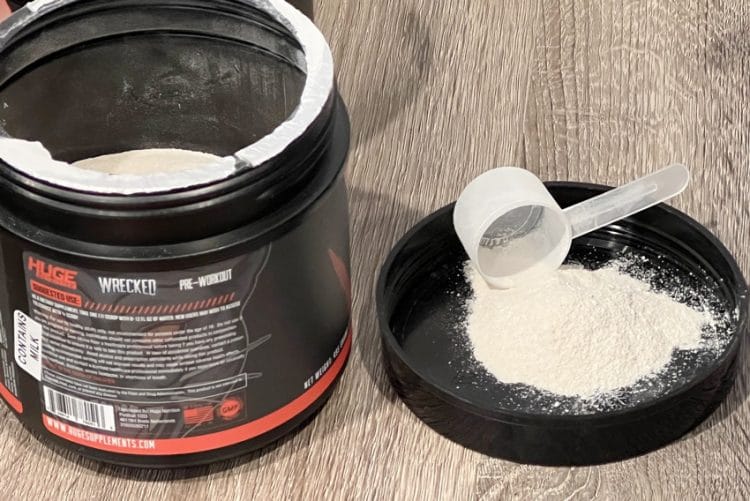
Benefits of Using a Homemade Pre-Workout
If you thought a homemade pre-workout is only used by people who want to save money, what you’re about to read next might change your mind. Listed below are the advantages of using a homemade pre-training supp:
1. Use of High-Quality Ingredients
While making a homemade pre-workout, you’re actively choosing what you’re putting in your body. Most supplement brands hide their ingredients behind a proprietary blend, masking the ingredients and their dosages.
This is a common practice used by sports nutrition companies to cut costs while boasting about the most potent ingredients on the label. In many cases, these brands keep the expensive ingredient doses at a minimum and spike the serving size using fillers.
2. Effective Dosages
Many pre-workout supps hide their ineffective formulas by overdosing on the stimulants that can make you feel jittery and set you up for sudden energy crashes when the effects of the supp start to fade. This phenomenon is so common that they even have a term for it — pre-workout crash.
When you make your own pre-workout, you can ensure the use of the right ingredients and dosages for optimal results.
3. Cost-Effectiveness
Buying pre-workout ingredients in bulk can save you a lot of money in the long run.
Effective pre-workout supplements sold on the market can be expensive. However, the ingredients of these supps, when bought separately, are budget-friendly.
The markup you pay for the shelved pre-workout products is usually the result of a brand’s marketing and overhead expenses.
4. Versatility
The thing about pre-workout supplements is that what works for one might not work for the other. A pre-training supplement contains stimulants and energy-boosting ingredients, and different people have different tolerance for these ingredients.
For example, your training partner might feel a surge of energy after taking a scoop of the Wrecked pre-workout supp due to its 250 mg caffeine content. On the other hand, you might not feel anything due to your high caffeine tolerance.
However, when you’re working with a homemade pre-workout supplement, you have the flexibility of fine-tuning your dosages to better suit your needs.
You could use a two-scoop serving of the Wrecked pre-workout to increase the caffeine dose, but that will also double the dosage of all other ingredients, which could be an overkill.
Read our complete review of the Wrecked Pre-Workout Supplement here!
Homemade Pre-Workout Ingredients
Different brands on the market use a variety of ingredients. However, we won’t be going over each of them in this article. In this article, we’ll break down the most potent pre-workout supplement ingredients into four categories.
1. Energy and Focus
These ingredients help power your workouts and improve your focus during workouts:
a. Caffeine
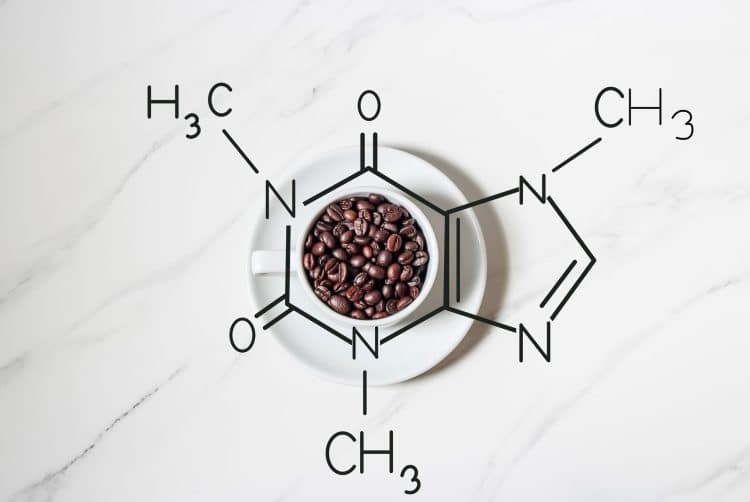
Caffeine is one of the most popular pre-workout ingredients. It gives you a kick in the rear when you’re low on energy and is a great ingredient to fuel your workouts.
Many people prefer caffeine anhydrous in their pre-training supp as it is a concentrated form of caffeine, which improves exercise performance and alertness.
Depending on your caffeine tolerance, you could experiment with 100 to 350 mg of the ingredient in your homemade pre-workout supp.
b. L-Theanine
Theanine is an amino acid found in tea and some mushrooms. It comes in two forms — L-theanine and D-theanine. However, L-theanine is the most common form.
L-theanine is known for its cognitive enhancing abilities. Furthermore, it can boost the effects of caffeine. The recommended dosage consists of 500 to 2,000 mg of the ingredient.
c. L-Tyrosine
Tyrosine is an amino acid that supports the production of several important brain chemicals, including dopamine, epinephrine, and norepinephrine.
It can help improve mental alertness and give you the coveted tunnel vision. Tyrosine is commonly taken in doses of 500 to 2,000 mg per serving.
2. Muscle Pumps
Many people rely on pre-workout supplements for better muscle pumps, which the supps achieve by boosting vasodilation through nitric oxide production.
a. L-Citrulline
L-citrulline is one of the most potent nitric oxide boosters. The compound helps widen your blood vessels, boosting the supply of oxygen, blood, and nutrients to your target muscles, resulting in better pumps.
A pre-workout supplement can have anywhere between two to six grams of the compound.
b. Citrulline Malate
Citrulline malate is another form of citrulline that consists of malic acid. Like l-citrulline, an effective dosage of the compound can consist of two to six grams.
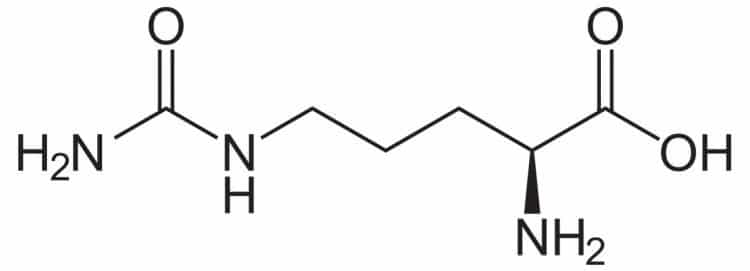
c. L-Arginine
L-arginine is the precursor for the biosynthesis of nitric oxide, meaning it can help you achieve muscle pumps during training. Furthermore, l-citrulline is broken in your kidneys into l-arginine and nitric oxide.
Taking the two compounds together can ensure muscle-ripping pumps. The dosage can range between two to six grams per serving.
3. Endurance
Endurance-boosting ingredients help you train for longer by delaying the onset of fatigue.
Beta-Alanine
It’d be safe to say that beta-alanine is the sports nutrition industry’s favorite endurance ingredient. You’ll find it in almost every endurance and stamina-boosting product.
Although it is a popular ingredient, you don’t want to go overboard with it. Overdosing with beta-alanine can cause the infamous tingling sensation. If you feel like you have ants crawling down your body, you’ve probably gone too hard on the compound. Keep your beta-alanine dosage between three to five grams and adjust per your tolerance.
4. Muscle Building (Optional)
Adding muscle-building ingredients to your pre-workout is optional as many lifters use a stand-alone BCAA and whey protein supplement. However, adding them to your homemade pre-workout supp can deliver solid results, albeit spiking its per-serving cost.
a. Creatine
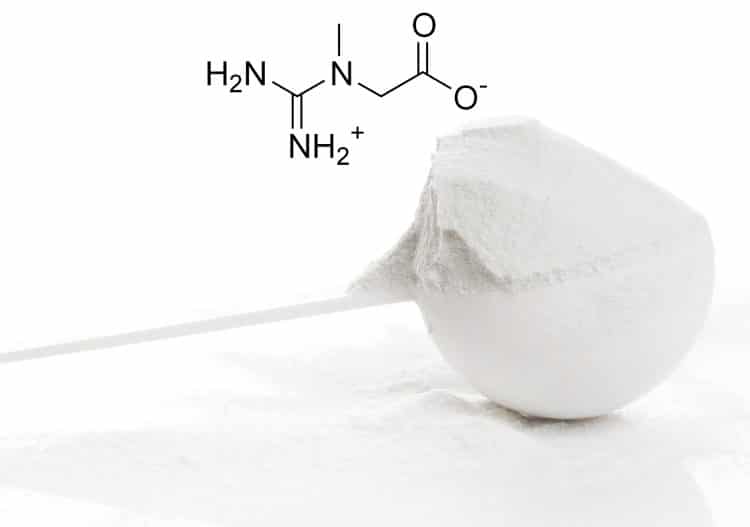
Creatine is one of the most effective, researched, and safe supplements. Supplementing with creatine increases its concentration level in the cells, leading to several health and performance benefits. [1]
You can add anywhere between two to five grams of creatine to your homemade pre-workout.
[sc name=”style-summary2″ ]
Tip: Use Creatine Intake Calculator for Men and Women.
[/sc]
b. BCAA
Branched-chain amino acids (BCAAs) are a group of three essential amino acids leucine, isoleucine, and valine, and one of the most popular intra-workout supplements.
They are commonly taken to boost muscle growth and enhance exercise performance. Limit your BCAA intake to two to five grams in your pre-workout drink. [2]
Check Out: Best BCAA Supplements of 2023
Homemade Pre-Workout Recipes
If you want an effective homemade pre-workout, you need to be well-versed with two recipes. These two formulas cater to two goals — building strength and muscle mass and improving your endurance and stamina.
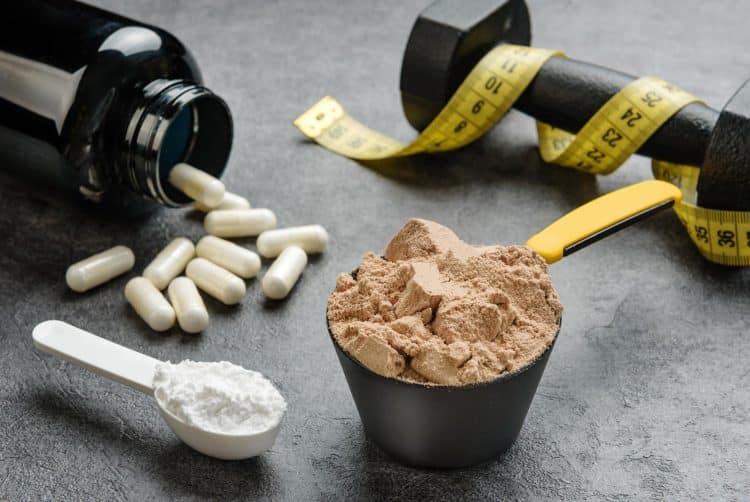
Homemade Pre-Workout For Building Strength, Focus, and Size
The first recipe on this list is for hardcore lifters who hit the gym with the goal of building muscle mass and strength. This formula will give you ample energy, focus, stamina, and endurance to crush any high-intensity or high-volume resistance workout.
- Caffeine: 400 mg (2 capsules)
- Creatine: 5 gm
- L-Tyrosine: 2 gm
- Citrulline Malate: 8 gm
- Beta-alanine: 3 gm
- BCAA: 5 gm
Homemade Pre-Workout For Endurance and Stamina
The second recipe is apt for people that engage in HIIT-style cardio workouts where high energy levels and stamina can make all the difference.
- Caffeine: 300-400 mg
- Beta-alanine: 5 gm
- L-Citrulline: 5 gm
- L-Theanine: 2 gm
Homemade Pre-Workout Ingredients Cost and Dosage
Check out the dosages and costs of the most popular pre-workout ingredients:
| Ingredient | Product | Name | Cost | Recommended Dosage |
| Caffeine | 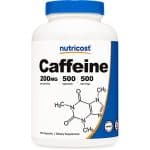 |
Nutricost Caffeine Pills | $17.95 | 100-350 mg |
| L-Theanine | 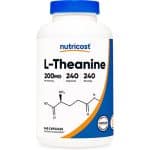 |
Nutricost L-Theanine | $15.95 | 500-2,000 mg |
| L-Tyrosine | 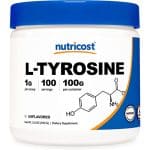 |
Nutricost L-Tyrosine Powder | $13.95 | 500-2,000 mg |
| L-Citrulline | 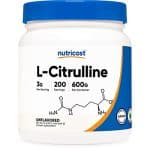 |
Nutricost Pure L-Citrulline | $28.45 | 2-6 gm |
| Citrulline Malate | 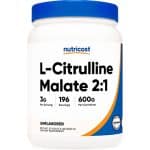 |
Nutricost L-Citrulline Malate | $29.95 | 2-6 gm |
| L-Arginine | 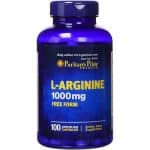 |
Puritan’s Pride L-arginine | $5.37 | 2-6 gm |
| Beta-Alanine | 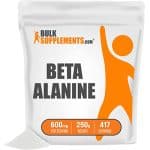 |
Bulk Supplements Beta Alanine | $12.31 | 3-5 gm |
| Creatine | 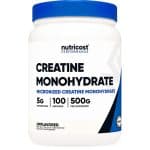 |
Nutricost Creatine Monohydrate | $31.95 | 2-5 gm |
| BCAA | 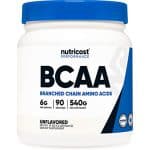 |
Nutricost BCAA Powder 2:1:1 | $22.75 | 2-5 gm |
How To Make a Homemade Pre-Workout
Here is how to make a homemade pre-workout supplement:
- Based on the recipe you’ll be using, put together all the ingredients on a table.
- In a shaker bottle, add the ingredients as per the recommended dosages and your tolerance level.
- Add 8 to 10 ounces of water to the shaker bottle.
- Mix well.
For ingredients like caffeine that come in a pill form, you could wash down the capsule with the pre-workout drink or add the contents of the cap into the shaker bottle.
All the ingredients on this list are unflavoured. However, if you want a flavored pre-workout drink, you could use a flavored BCAA or add flavoring agents to the shaker bottle.
[sc name=”style-summary2″ ]
Note: After purchasing the pre-workout ingredients, do not mix them in a single container. You have to consume the ingredients in specific doses, meaning you will have to add the ingredients to your shaker bottle every time.
[/sc]
Want to learn about the cost difference between making a homemade pre-workout and buying one off the shelves? Check out our breakdown of the per-serving and overall cost difference between the two.
Disadvantages of Using a Homemade Pre-Workout
Coming up with your own pre-workout has its own drawbacks, including:
1. Inconvenience
If you decide to use a homemade pre-workout, you will need to set aside an additional two to five minutes before your workout to make the drink. You’ll have to mix the ingredients in specific dosages every time.
Furthermore, at some point, you might run out of an ingredient and will have to make do without it until it arrives in the mail, which could hamper your performance in the gym.
2. Trial and Error
If you’re opting for a custom pre-workout for better effectiveness, you’ll have to undergo several ingredient and dosage changes before you arrive at what works for you.
3. Upfront Cost
While a homemade pre-workout will save you money in the long run, you’ll have to spend a considerable amount initially. For example, the ingredients mentioned above will cost you $178.63, whereas an effective pre-workout supplement like Transparent Labs BULK costs you $49 for 30 servings.
Read our complete review on Transparent Labs BULK Pre-Workout here!
4. Taste
It is recommended that you begin testing a homemade pre-workout without using a flavorant. However, you could use a flavored BCAA to make the pre-workout drink taste better.
Once you’ve nailed down the ingredients and dosages that work for you, you could start experimenting with a calorie-free flavorant.
[sc name=”style-summary2″ ]
Learn more about pre-workouts:
- Best Pre-Workout Supplements
- Best Pre-Workouts for Weight Loss
- Best Pre-Workouts Without Creatine
- Best Tasting Pre-Workout Supplements
- Strongest Pre Workout Supplements
- Best Caffeine-Free Pre-Workout Supplements
[/sc]
Wrapping Up
You don’t need a degree in chemistry to whip up a homemade pre-workout. Furthermore, the recipes listed above lay out the exact ingredients and dosages to deliver solid results.
Remember, pre-workout supplements do not work in isolation. To see results in the gym, ensure your training, diet, and recovery programs are on point. Best of luck.
References
- Buford TW, Kreider RB, Stout JR, Greenwood M, Campbell B, Spano M, Ziegenfuss T, Lopez H, Landis J, Antonio J. International Society of Sports Nutrition position stand: creatine supplementation and exercise. J Int Soc Sports Nutr. 2007 Aug 30;4:6. doi: 10.1186/1550-2783-4-6. PMID: 17908288; PMCID: PMC2048496.
- Blomstrand E, Eliasson J, Karlsson HK, Köhnke R. Branched-chain amino acids activate key enzymes in protein synthesis after physical exercise. J Nutr. 2006 Jan;136(1 Suppl):269S-73S. doi: 10.1093/jn/136.1.269S. PMID: 16365096.


